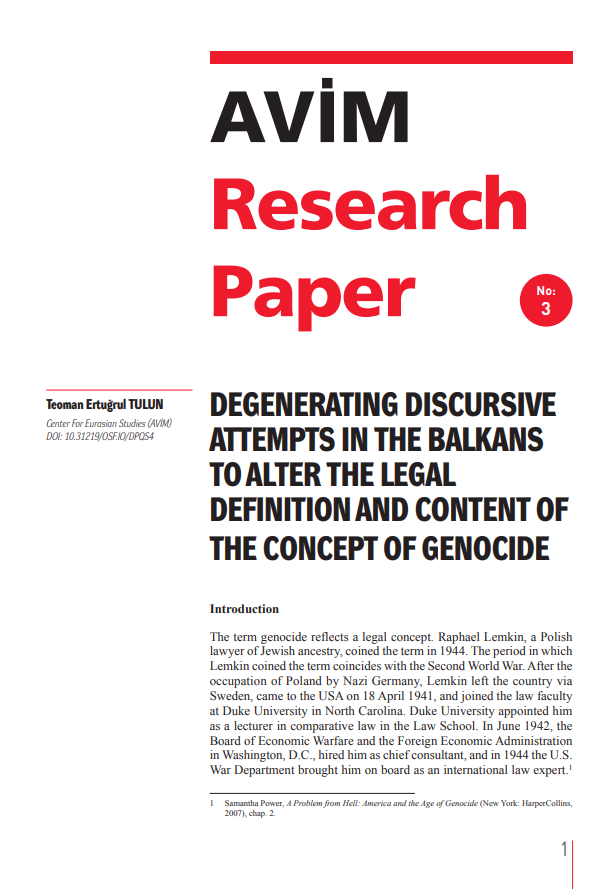ARTICLE TITLED: “DEGENERATING DISCURSIVE ATTEMPTS IN THE BALKANS TO ALTER THE LEGAL DEFINITION AND CONTENT OF THE CONCEPT OF GENOCIDE"
Download PDF :


Date of Publication: 17 December 2021
Raphael Lemkin, a Polish lawyer of Jewish ancestry, coined the term of genocide in 1944. The period in which Lemkin coined the term coincides with the Second World War. He started to write his most significant work, Axis Rule in Occupied Europe, in 1942. He formulated his work in Nazi Germany's and other Axis Power's occupation policy especially in Poland and the Soviet Union. Lemkin's central insight was to deduce from these occupation regulations that the Germans intended to reorganize Europe along racial lines, which would entail mass murder and the suppression of other cultures. Lemkin modified his initial proposals on genocide formulated in the Axis Rule in Occupied Europe and advocated that the newly formed United Nations should sponsor a treaty to prevent genocide and use its machinery to enforce it.
On December 11, 1946, one year after the final armistice, the UN General Assembly unanimously passed a resolution which stressed that "The punishment of the crime of genocide is a matter of international concern."In the ensuing period, The Convention on the Prevention and Punishment of the Crime of Genocide (Genocide Convention) was adopted by the General Assembly of the United Nations on 9 December 1948. According to the Genocide Convention, genocide is a crime that can take place both in times of war and in the time of peace. The concept of genocide, which Lemkin brought to the agenda and tried to make it an international crime, was fully established on a legal basis by adopting the legally binding Genocide Convention.
The Genocide Convention should not be eroded, and the term genocide, which has a strict legal definition, should not be used randomly. Recently statements were made that will erode the genocide convention, especially in the Balkans. Statements by the President of Croatia, Zoran Milanovic, downplaying the Srebrenica Genocide are example. Speaking to the press in the city of Komija on the Croatian island of Vis, Milanovic, answering a question on whether he considered Srebrenica a genocide, recently said the following: "I say yes, but then for some more serious crimes, we have to invent another name. I respect other people's sacrifices, but not everything is the same. If everything is genocide, we will have to find another name for what the Nazis and the German machinery did to the Jews in the Second World War. It is the Holocaust, but it is also genocide. Not every victim is the same, it is relativization.'' Considering that certain EU countries have been recently bringing up revisionist views and suggestions regarding the Balkans, we cannot ignore the possibility that Milanovic will jump on the bandwagon of producing "brilliant" ideas. In this context, it suffices to recall the Slovenian Prime Minister's plan (as the Slovenian EU presidency) to dismember Bosnia and Herzegovina, reorganize the borders of Croatia, Serbia, Albania, and Kosovo..The statements of Milanovic in this respect are also noteworthy in that they seriously question the current legal basis and framework of the crime of genocide.
Click for More





























